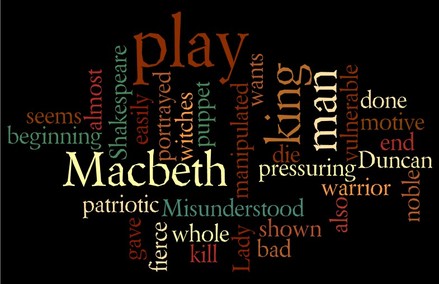


The “terrible ambitious agency” that Emma Smith speaks of is, in fact, the central issue that Macbeth grapples with in the play: the protagonist’s ambition is “terrible” because he pines after something that doesn’t naturally belong to him.Īmbition, like Renaissance subjects, had its time, place and limits, which implies that ambition of the transgressive sort can only be an unnatural, and therefore dangerous, desire, which – if entertained and pursued – will result in disastrous ends. Had Macbeth been no more than a propagandistic vehicle, however, its relevance wouldn’t have lasted into the present day – almost 400 years after its first ever performance.Īnd one of the reasons for this is Shakespeare’s vivid portrayal of ambition and its impact on human psychology and behaviour, which remains a point of fascination for audiences across the globe (and beyond the Globe). The sense of moral outrage and disturbance in Macbeth is Shakespeare’s invention, turning the brutal chaos of the sources into a story of rightful succession interrupted by the terrible ambitious agency of Macbeth.” “For all fascination with regime change and weak kings, and the question of what makes a good ruler, Shakespeare is here the mouthpiece for Jacobean hereditary monarchy, for his new king James, and for the Stuart dynasty safely cushioned by two young princes. Indeed, it’s endorsed by prominent Shakespearean scholar Emma Smith, who writes in her accessible and illuminating monograph This is Shakespeare : With James I as the patron of Shakespeare’s troupe – renamed from Lord Chamberlain’s Men to The King’s Men upon James’ ascension to the English throne, this interpretation does seem valid. On the most obvious level, the play cautions against overreaching ambition – especially the sort directed towards the throne, and in that sense, Macbeth doubles as a pro-establishment deterrent directed towards Guy Fawkes sympathisers or potential insurgents. The Gunpowder Plot conspirators – Guy Fawkes is the third from right Macbeth was first performed in 1606 – one year after the 1605 Gunpowder Plot, which was a failed attempt to assassinate James I and to blow up the Parliament.Īrriving hot on the heels of such a shattering incident, Macbeth and its clear parallels to the political happenings at the time would not have been lost on the King or Jacobean audiences. Given the strong political connotations of ambition in Macbeth, its historical context is important for a deeper understanding of the play. The historical context of Macbeth : James VI and I, the Gunpowder Plot, and the ‘King’s Men’ The ideological framework for this was the so-called ‘ divine right of kings ’ theory, which was institutionalised by James VI of Scotland, who in 1603 became James I of England after Elizabeth I’s death. if you don’t have royal blood, you can never – and should never want to – become king. Kingship was believed to be divinely preordained, i.e. Anyone could become wealthy by virtue of wits and hard work, but not everyone could be king. In the Renaissance worldview, there was a limit to which different people could achieve their ambition. It is also a relative concept, the meaning of which differs substantially depending on the historical period in question. The word ‘ambition’ is defined as ‘a strong desire to achieve success’.ĭepending on one’s disposition and values, ambition could be the single most important quality in life, or an overrated, misery-inducing ticket to the modern rat race. In that post, I left out ambition on purpose, largely because I wanted to save it up for a full-length post, which you’re now reading. Previously, I wrote about the primary causes of Macbeth’s fall. Vaulting ambition, which o’erleaps itselfĪt first, Macbeth is reluctant to resort to violence in service to his ambition, but with prompting from Lady Macbeth, he slides down the slippery slope of sacrificing others for his own ends.(This post contains a detailed video on the topic) To prick the sides of my intent, but only At various points, Macbeth himself is aware of this tension, as you can see in these lines where he describes how he needs his ambition to succeed: Eventually, this pursuit of goals becomes Macbeth’s hamartia, or fatal flaw.Īs the play progresses, the tension increases between ambition and what must be sacrificed to achieve a goal. Together with his wife, Macbeth commits increasingly more violent acts to achieve his goal, sacrificing everything for ambition. The witches tell him he will become king, planting the seed of ambition in his soul. The title character of the play Macbeth is a Scottish general who listens to the prophecy of three witches. One of the strongest themes in Macbeth is ambition and the destruction that can happen when hubris and greed for power go unchecked.


 0 kommentar(er)
0 kommentar(er)
